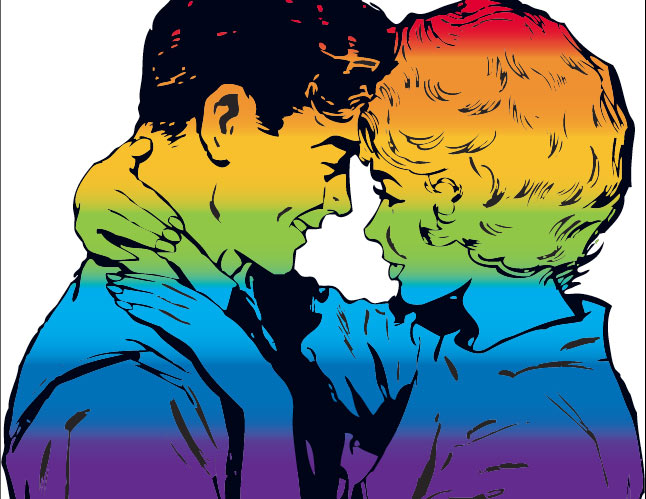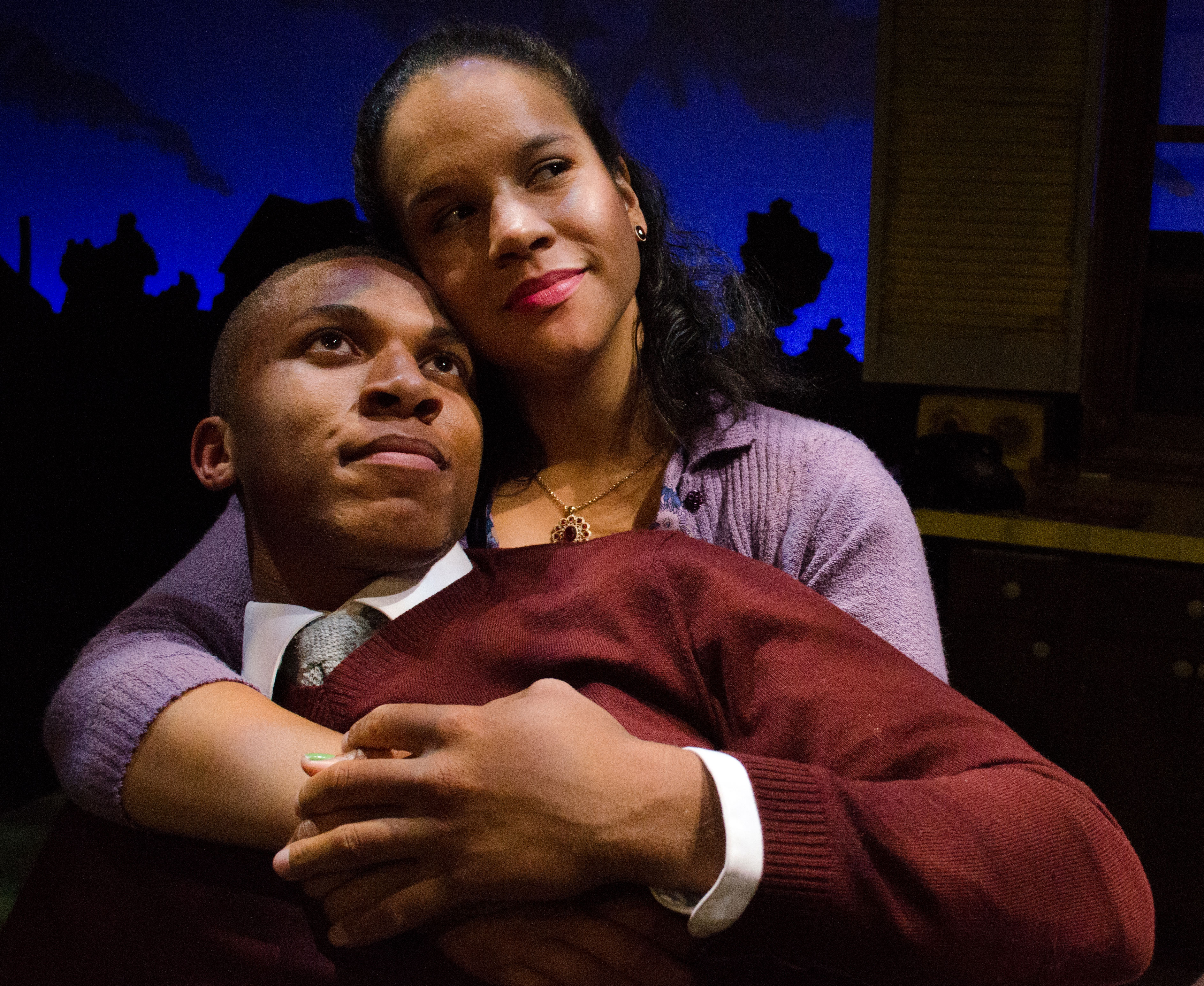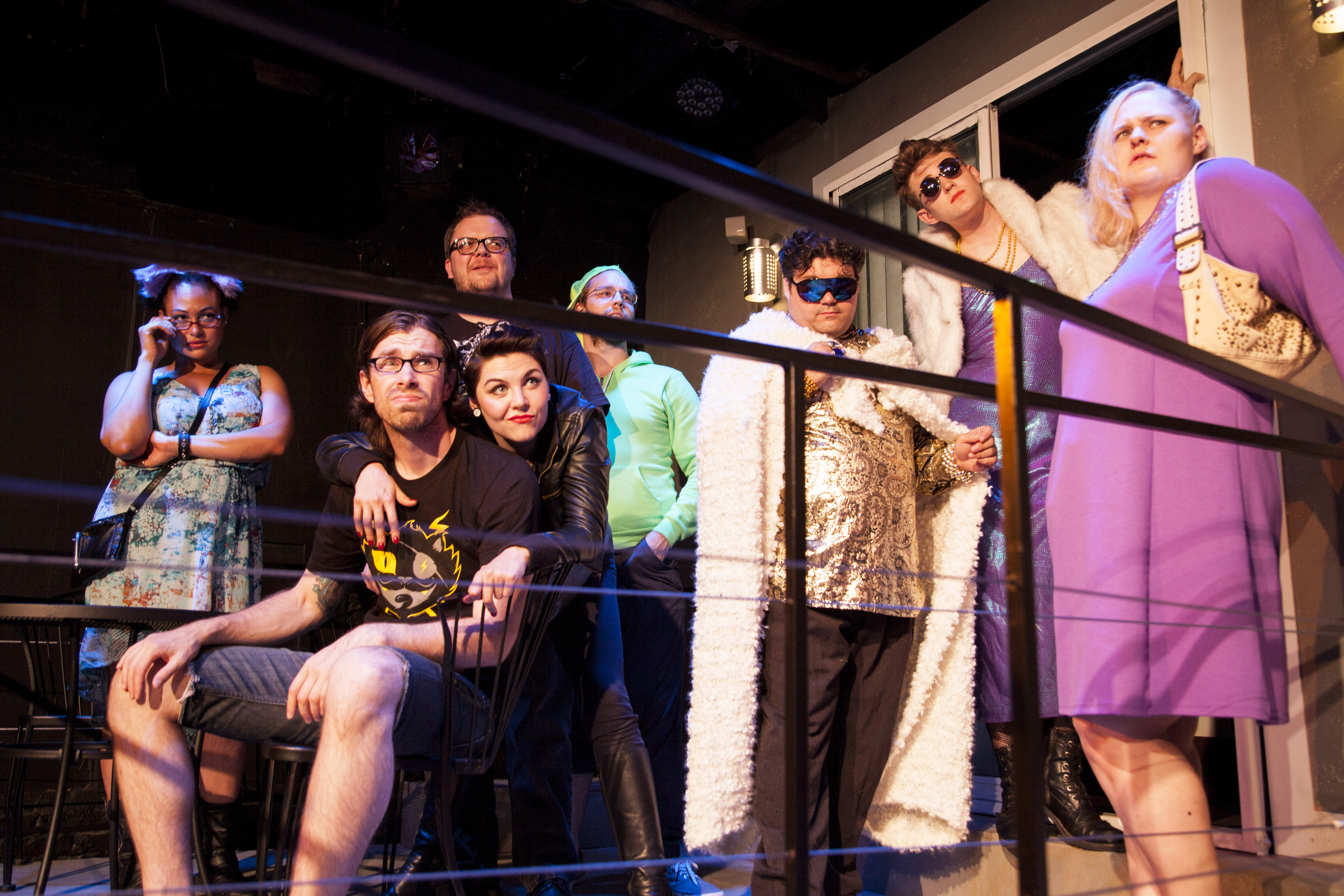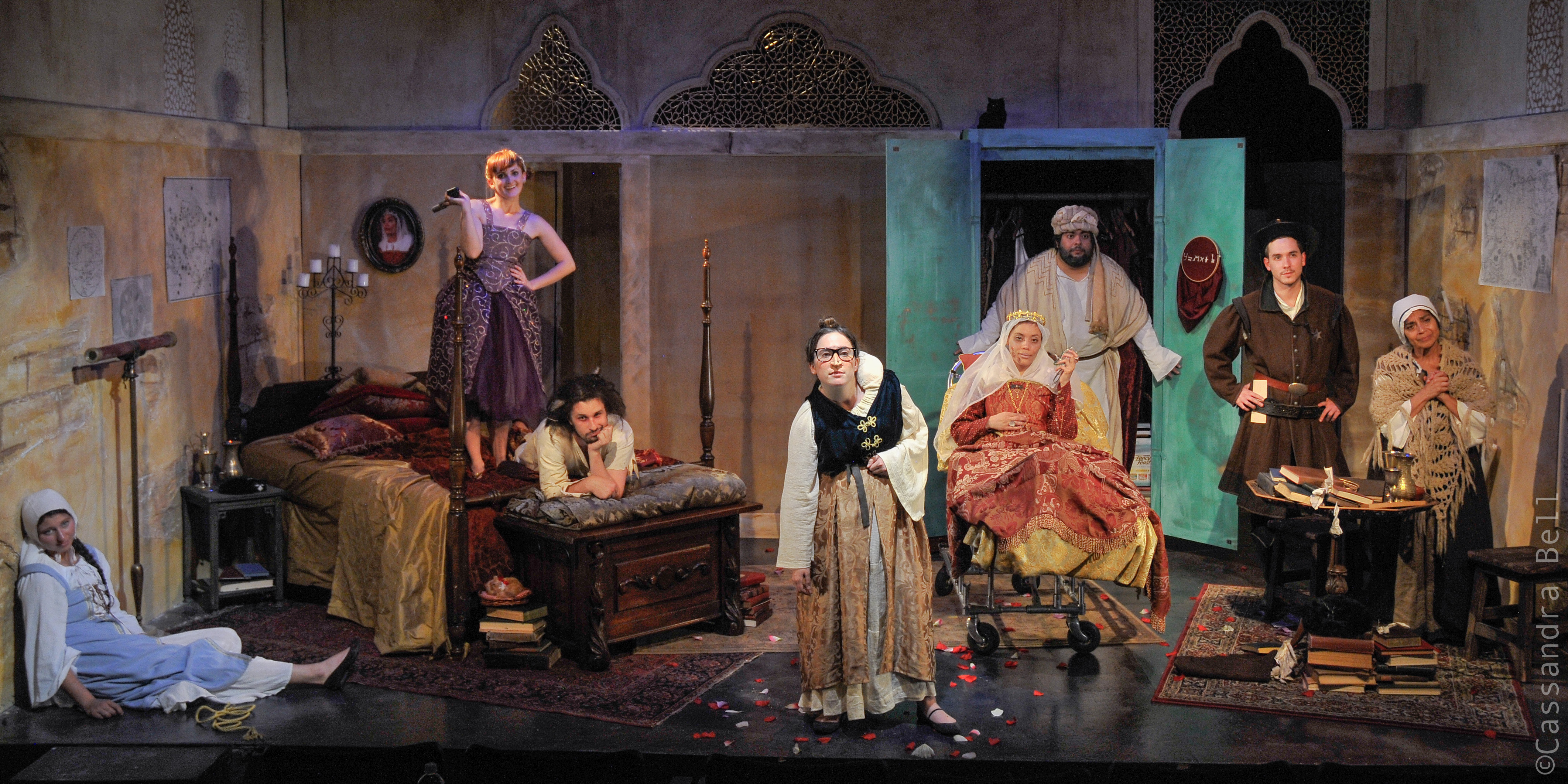Legalizing gay marriage will destroy the institution of matrimony.
That’s been the battle cry of the religious right since the debate began taking shape more than a dozen years ago. And whenever it’s mentioned these days, you can expect talking heads like James Dobson of the Family Research Council, onetime presidential candidate Gary Bauer, and/or Redmond pastor Kenneth Hutcherson to pop up on your flatscreen long enough to repeat just that: Same-sex marriage will corrode the pre-eminent organizing social construct known to man. Now is that what you want?
When pressed for details as to precisely how same-sex marriage will destroy straight marriage, opponents reply that matrimony is “traditionally” between two members of opposite sexes—an observation that reframes the issue while dodging the question. Debate about what might be in the future is short-circuited simply by invoking precedent.
After all, “traditionally,” black people were once considered property, women had no right to vote, and slaughtering Native Americans was simply one more plank in the platform of Manifest Destiny. Didn’t those “traditions” merit destruction, or at least a thorough rethinking?
Conservatives often counter that matrimony is the linchpin of the family unit, and—as anyone who listens to right-wing radio shows like Laura Ingraham’s knows—families “ideally” comprise a man and a woman. But we’re already falling short of this wistful image in numerous ways, including divorce, single-parent families, and babies born out of wedlock. For that matter, “ideally,” only people who can afford the cost of rearing children should be having them. Yet none of these factors precludes a man and woman from marrying or remarrying in a civil ceremony.
Washington voters will get a chance to have their say on the subject, if supporters of Referendum 71 have collected enough valid signatures to place the issue on November’s ballot. Backers of the referendum want SB 5688, the “everything-but-marriage” law—which has yet to go into effect, despite its April passage by the state legislature and its May signing by Governor Christine Gregoire—overturned. At the moment, the signatures are still being authenticated, with the results so far “too close to call.”
In Massachusetts, where same-sex marriage has been legal for the past five years, Dr. Charles Foster is the co-founder and director of a family therapy facility called the Chestnut Hill Institute. Foster believes that opponents of same-sex marriage represent a segment of the population who yearn for the America of their youth or an imagined perfect past. “These are people feeling squeezed from every direction,” he says. “Their jobs are vanishing overseas, homes are being lost, and now these are the very same folks showing up at town meetings to say they’re mad as hell and not going to take it anymore, and they’ve been exploited by the right. Back when Nixon ran for president in 1968, conservatives realized that the only way to get a majority was to convince these people to vote against their own economic self-interests, and the best way to do that was to threaten them with the loss of a lifestyle they cherish.”
Defending marriage as a one man/one woman proposition became their cultural Alamo as other traditions began to topple, says Stephanie Coontz, who teaches history and marriage studies at The Evergreen State College in Olympia. “Even as families have become more diverse, there remains a nostalgia for that Ozzie-and-Harriet life,” she says, “but ironically enough, those same changes in the ways people couple and marry have been the ones that now attract homosexual couples. You could argue that gays haven’t come to the idea of marriage; marriage itself has become a more attractive proposition for gay people.”
Less than a century ago, most states’ marriage laws included “head and master” clauses, which not only sanctioned men requiring women to take their surnames, but allowed the husband to determine where the couple would live and to have final say on matters of community property. “And,” Coontz points out, “there was no such thing as marital rape.”
“In that 19th-century mindset of marriage, the man had a duty to support his family and the woman was responsible for supplying services needed in the home—including sex,” she continues. “And it wasn’t until 1993 that the last state did away with that. Marriage used to be an institution very much oriented around heterosexuals because it was based in large part upon the inheritance and passing-along of power and property for political and economic convenience, and one was not allowed to marry for love. Over the last 150 years, it’s heterosexuals who have chipped away at those notions.”
That process accelerated during the sexual revolution of the 1960s. “Over the last 40 years,” Coontz says, “it’s been heterosexuals who’ve said you should marry someone you’re compatible with. They’re the ones who’ve said you shouldn’t be required to have children, or that you should use assisted reproduction if you want kids. Gay couples are simply buying into a model of partnering that now seems much more appealing to them.”
Since many social conservatives equate legalizing same-sex marriage with “condoning a lifestyle” they abhor, legal protection is perhaps the most important aspect of same-sex marriage. If gays can depend on the law to enable them to visit a lover in the hospital and pass on and receive property and money, they can then build on that foundation toward a broader acceptance in the communities where they live. Toward that very end, last Friday I had to put aside this piece long enough to drive to Olympia to register myself and my guy of 13 years as domestic partners: Not because we don’t already have power of attorney and wills that spell out to the last detail who gets what if either of us dies, but because our insurer wants to clear their books of anyone who merely “claims” to be a domestic partner. So with a less-than-30-day window, we had to find notaries during a workday and take time to present ourselves, along with bank statements and oath-swearing that yes, we’re homos and we share bed, bath, and Dash, the wonderhound.
Over many a meal, I’ve quizzed friends and family alike about just how legalizing same-sex marriage might affect straight marriage, or the institution as a whole. That’s when my partner usually starts texting, twitching, or ordering that next mimosa.
Over crepes one Sunday morning, I broached the topic with a straight couple, one of whom is an ordained minister. We began discussing the biggest tangle in the way Americans regard marriage: Some consider the practice a civil r-i-g-h-t provided by the state with social entitlements and privileges, others believe it to be a religious r-i-t-e, a sacred covenant bestowed by The Creator. Until we’re able to sort out the two, I declaimed, we’ll never find common ground, because there are all kinds of people who wouldn’t mind letting gays be legally linked by a judge who’d nevertheless prefer not to have their hallowed church grounds sullied by two people of the same sex professing mutual devotion at the altar. Then I asked the husband how his arrangement with his own wife might have been different if they hadn’t used their Christian beliefs as a template. “Well,” he said as his wife’s eyes widened in surprise, “I suppose I would have negotiated our monogamy agreement differently.”
It’s widely supposed that gay men don’t necessarily equate partnership with monogamy; they’re able to separate emotional fealty from sexual fidelity. Opponents deride such distinctions as “compartmentalization.” But there are sociologists who maintain that men and women are hard-wired by nature to be polyamorous. Gay couples whose relationships are “open” don’t consider themselves depraved. They regard themselves as honest with each other and candid about their sexual impulses.
Earlier this month, Scientific American published a survey presented at the annual convention of the American Psychological Association. Conducted by Alliant International University in San Francisco, the survey compiled responses from two groups of couples, comprising people who self-identified as gay men, heterosexual men, lesbians, or heterosexual women. Some 12,000 respondents replied to the query in 1975, and another 1,000 answered a similar set of questions in 2000. The finding? Monogamy rates have soared. While 82 percent of gay men reported sex outside their primary relationships in 1975, that rate had decreased to 59 percent in 2000. Still, that rate is four times that of heterosexual men (14.7 percent) and straight women (13.5), and seven times that of lesbians (8.2). All four rates represent a decline in extra-partnership sex, from percentages in the mid-20s in the 1975 survey.
Examining the long-term incidence of infidelity, “what we found in our data is pretty reliable,” says Foster, who co-authored a book on the subject, When Good People Have Affairs, with Chestnut Hill co-director Mira Kirshenbaum. “Over the last century, if you’re straight, the probability of one of the two of you cheating is about 50 per cent. Of course, that varies widely over a host of local and individual circumstances; the best method in predicting an affair is in using risk-factor models, and one of the most important is opportunity. If you’re a farmer with not much exposure to the outside world, as opposed to a traveling salesman, you’re going to have a very different level of opportunity. It’s opportunity that’s been responsible for the increase in the number of women having extramarital affairs. There was a reason that two generations ago, the jokes about infidelity revolved around milkmen and postmen. That was the only opportunity for many of these women to come into contact with men. In affairs these days, it’s roughly 45 percent women, 55 percent men.”
But do successful open gay relationships create a path that heterosexuals could follow? Wouldn’t an honest, open arrangement have kept high-profile philanderers like Govs. Mark Sanford and Eliot Spitzer, Johns Ensign and Edwards, David Vitter, and even Larry Craig from making such hypocrites of themselves?
According to Dr. Pepper Schwartz, professor of sociology at the University of Washington and former president of The Society for the Scientific Study of Sexuality, “Gay men make a lot of rules about open relationships because they are terrified to have lost partners, either to disease or another man. And gay men’s rules about openness tend to be very strict: You can do it if it’s only phone sex, or there’s no exchange of fluids, or other very specific caveats. Do I think open relationships will ever be legitimized? Well, I certainly don’t see any indications of it happening anytime in the foreseeable future.”
My sister owns a limousine service in Phoenix, and some time ago I helped out during a busy week by driving for her. I picked up one of her clients at his door—in the nicest suburb in town. He kissed his wife deeply, picked up each of his kids and snuggled them, and off we went to pick up his buddy. The rest of the night was spent hunting for girls. I told my sister it creeped me out, and she replied, “Kevin, you have no idea what these people’s arrangement is. You can’t judge what you don’t know.”
It turns out that heterosexual marriage is more transitional than traditional. In fact, “traditional” marriage is in free fall in Europe, Foster says, and has been since the introduction of the Pill in the 1960s—legally, through prenuptial agreements and no-fault quickie divorce, socially, with more single and unmarried parents, and, perhaps a few would say, morally, with innumerable unwed couples living together. These loose affiliations have appeared so recently that we’re still finding words to describe them, and governments are struggling to keep pace.
Take France, for example, a country regarded by many as socially progressive and secular, but nonetheless one of the most Catholic countries in the European Union. In 1999, the French National Assembly enacted a system—the Civil Solidarity Pact, or PACS—by which gay couples who were being denied traditional church marriage could still enjoy some of the protections of the state. The legislation’s wording was intentionally ambiguous, and left-leaning partisans (a slight majority at the time) were able to secure its passage as an issue of fairness under the law.
But a lack of specifics in the law provided just the loophole straight couples had been seeking—a way to loosely bond and receive many of the civil benefits of marriage without having to invite the Holy Roman Catholic Church to weigh the merits of their relationships. Moreover, in the decade since its passage, the PACS has come to be used overwhelmingly by heterosexuals. One of every three heterosexual couplings is now registered as a PACS, according to government statistics. Tax law in France has been amended to incorporate such couples, and even the most elegantly appointed city-hall rooms once used for weddings are now routinely rented out for PACS “celebrations.”
The PACS offers many of the legal benefits of marriage, including affording its participants “mutual and material” assistance, particularly in reference to illness and employment. Basically, the partners (never more than two) must be 18 or older and must share a residence. In addressing these issues, the PACS closely parallels what Washingtonians have come to recognize as the “everything-but-marriage” law which may or may not come up for a referendum vote this fall.
But the closest corollary to the new state law is actually one that was already on the books: Washington state marriage law. The act, the approved SB 5688 that Referendum 71 seeks to put to public vote, merely added the institution of domestic partnership to currently existing laws about marriage on the state books. So if it is de facto marriage, why not just call it so and be done with it?
It appears that marriage as a social contract continues to evolve, but that has much less to do with gays and lesbians wanting to get married than with the desire to make marriage more relevant to the current social order.
As new options for committed relationships appear and rearing children outside a traditional relationship loses its stigma, there seems to be less peer pressure to get or remain married. And that, ironically enough, has raised the prevailing level of marital bliss. According to Foster, marital satisfaction has actually risen over the past century “due to the divorce rate which weeds out unhappy marriages. As a result, the couples who remain married seem relatively happy.”
If changing antiquated notions of what it means to be married is what the religious right means by “destroying,” maybe gays do have an ice pick in one hand and a blowtorch in the other. Change is, after all, an act of destruction as far as the previous order is concerned. Still, Coontz points out, “There has never been a bill proposed that would force a church to recognize a marriage that they felt they didn’t want to. The movements to recognize same-sex marriages in churches are actually coming from inside the churches these days, and even very committed evangelicals are moving on this issue.”
“Oh, you’ll always have some bitter-enders, like the guys we found living in caves 20 years after World War II,” Foster says with a chuckle. “But here’s what’s going to happen. The more gay people who get married, the more who will. So they’ll marry, live their lives, and in some cases, divorce. It will seem normal because it will be normal.”
Schwartz agrees, but predicts there may be more changes on the horizon for heterosexuals should same-sex marriage become an everyday occurrence. “People do change patterns of behavior, and certainly the fact that marriage today doesn’t look like marriage 50 years ago is evidence of that. But they don’t change based on statistics they see or some documentary on TV. They change because of the people they know and come into contact with. So as homosexual couples marry and make friends with heterosexual couples, that could have an influence in ways we haven’t seen yet.”
Could it be that traditional marriage, like communism, is an outmoded social contract straining under the weight of its own inflexibility? In the final analysis, it may not be same-sex marriage, but a simple insistence to self-determine, that’s causing brittle institutions of church and state to crack. More and more, people are writing their own vows and arriving at a moral code that may not include what they consider antiquated notions handed down from the Founding Fathers or religious mores dating from the first century A.D.
What will it mean when we don’t all agree on a God, or what a wedding should look like, or what should constitute a family? Take a look around: We’re already there.
Kevin Phinney reviews theater for this paper. He is the author of Souled American: How Black Music Transformed White Culture.









